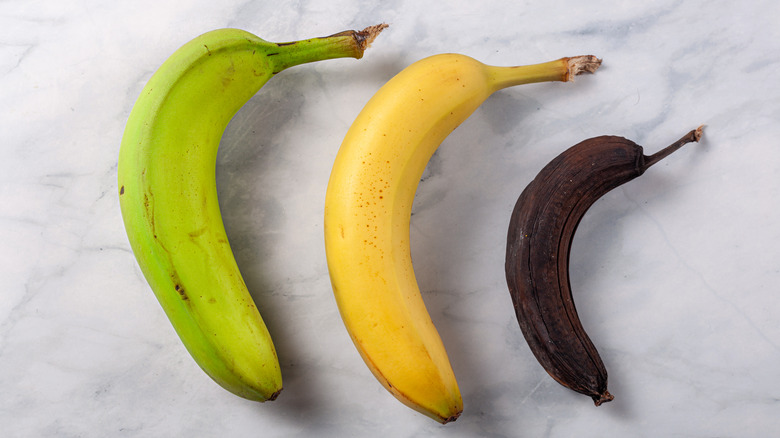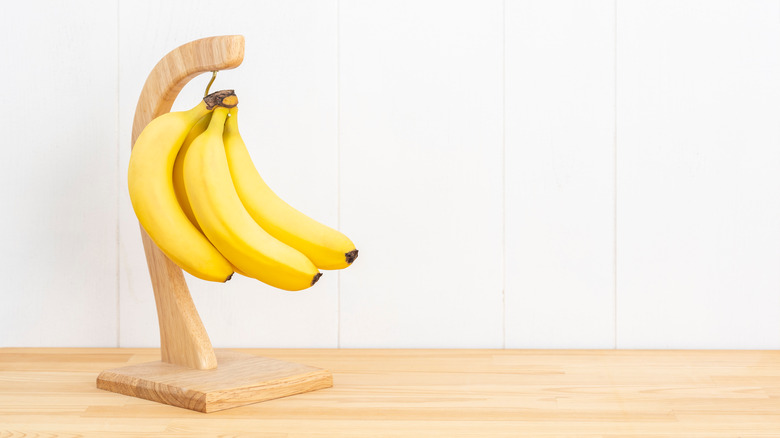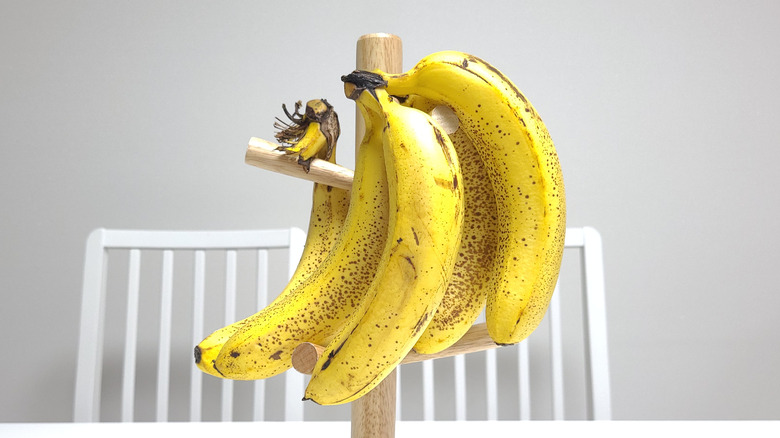The Clever Countertop Gadget To Keep Bananas Fresh Longer
You've just gotten yourself a bunch of bananas. Who knows what sort of delicious treats you're going to make with them? Maybe a banana cream pie or maybe some Bananas Foster? The possibilities are endless! All you have to do is peel — ah, wait. Scratch that. The bananas just turned brown and there's some kind of weird juice dripping out of them. Better luck next time, we guess? Next time you ought to be a little quicker than that if you want to use them.
Bananas are a very fickle fruit. One moment they're sitting on your countertop all yellow and pretty and the next they're a discomforting shade of brown and are mushy to the touch. What causes them to go bad so quickly? The answer is that your bananas aren't rotting or going bad, they're actually ripening too fast thanks to a natural reaction. Bananas produce their own ethylene gas, which acts as a sort of hormone that controls the fruit's ripening. The more of this gas that is released over time, the more fruit begins to ripen. It would stand to reason, then, that the only way to keep your bananas from turning brown too quickly is to prevent the build-up of ethylene gas.
There are many methods to ensure your bananas don't ripen too quickly, true, but you've probably never considered that simply hanging your bananas would make a noticeable difference. How does hanging your bananas keep them at that perfect stage of ripeness for longer?
How a banana hanger keeps your bananas fresh
You've probably seen bananas hanging from a banana hanger before. It looks like a little stand with a hook at the end that you're supposed to hang your bananas off of. What exactly is the purpose of this? Is it for display purposes? Does it trigger some kind of primal human memory of reaching out from a tree limb to grab bananas right off the neighboring tree? All good guesses, but the true answer has more to do with airflow.
While a banana hanger may seem like another quirky kitchen appliance, its design actually helps to contribute to keeping the bananas fresher. By keeping the bananas suspended in mid-air, there's much more movement of air around the bananas than there is when they're placed on the counter. This helps to prevent the build-up of ethylene gas that could settle around the bananas, thus slowing down the ripening process. Another bonus is that the banana hanger prevents the fruit from being damaged or bruised, which can also help hasten the ripening process. However, the key focus of the banana hanger is keeping the bananas away from other objects and free from any obstructions that could allow the build-up of ethylene gas.
A banana hanger is available at most grocery stores and is relatively cheap to buy. You can also hang your bananas from a cabinet hook if you have one, which will work just fine in keeping unobstructed airflow around the bananas.
Why you should store bananas away from other fruits
Let's say that you buy a hanger, hang your banana bunch on the hook, and put it next to your bowl of apples and your bag of oranges on the counter. After a few days, you'll notice that, despite hanging the bananas, they're still getting brown pretty quickly. What could be wrong?
The problem isn't with the banana hanger, but with where you placed it. Certain types of fruits like apples, oranges, and bananas all naturally produce ethylene gas, which can build up in enormous quantities when these fruits are stored together. Not only does the gas hurry the ripening of other fruits, but also the fruits around it. The bananas may be hanging in the air, but they're still surrounded by ethylene gas, which in turn makes them ripen faster.
To solve this issue, it's recommended to store your bananas — hanging or not — by themselves away from other produce. In the event you're unable to find a space for your bananas to "hang loose," you can alternatively put your bananas in the fridge or the freezer. The cold climate will help to slow the ripening process, so it's suggested that you do this with yellow, ripe bananas instead of green, unripe ones as they won't ripen as quickly in the cold temperatures. It's also suggested you peel and slice the bananas first if you have a bundle of them, though you can still leave the peels on one or two bananas.


